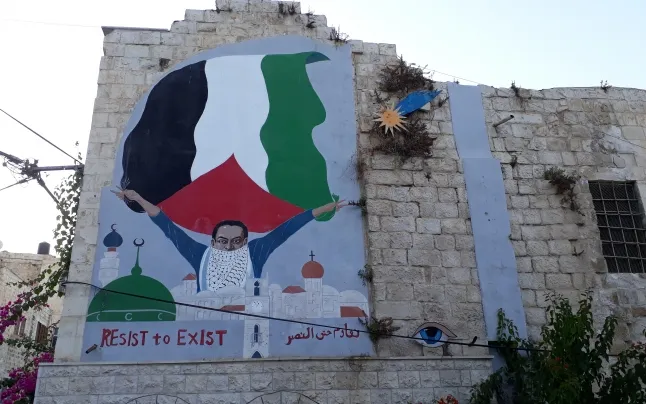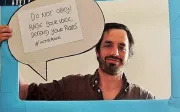Faced with the impossibility of travelling, international volunteering finds itself limited, which has led organisations to getting creative and boosting online work camps.
The unusual situation we are living through makes it difficult to travel, limiting the possibilities of carrying out international work camps and other international volunteering activities. International work camps are intercultural coexistence experiences in which a community and grassroots project in another part of the world is given support. Although organisations in this field were able to develop some work camps last summer, the current situation of uncertainty is again jeopardising these volunteer and training experiences.
As has been done in other areas with activities that allow it, the entities that organise international camps have looked for alternatives to be able to continue with these experiences, such as opting for the telematic format. The Service Civil International (SCI), an international and internationally renowned volunteer movement for peacebuilding, is one of the entities that has carried out successful online work camps, both in Catalonia and elsewhere in Europe.
The Service Civil International of Catalonia invites people living in Catalonia to participate in volunteering and training projects around the world and also organises work camps in our territory in which people from other countries participate. As Júlia Mullerat, who is in charge of volunteer projects in the territory, points out, the number of work camps has decreased and their participants have been mainly people from Catalonia.
"The option of doing projects online arose from our own experience working remotely and meeting online. We thought, why not put in touch people from all over the world with a common purpose and promote intercultural coexistence and group cohesion, and at the same time they could reflect on topics of interest, with a critical perspective, and strengthen their knowledge," explains Mullerat.
Mullerat, from SCI Catalunya, points out the difference between online work camps and the training courses that have been held online for months: "The starting point is the exchange that takes place rather than a formal education. It motivates these people to think that they can also be active and participate where they live, which in the end is the goal of the camps, whether they take place face-to-face or online, making it possible for people to spend time together and get to know other realities to then reflect," she adds.
Experience in Catalonia
Last year, in the face of the situation of uncertainty caused by Covid-19, the Catalan branch of the international organisation devised two work camps, the first of which already took place. The second one, meanwhile, will be carried out over the next few months. The first online work camp was on gender perspective from different topics of interest and eventually became an online training project, while the second work camp will be on sustainability.
Paula Ràfols and Martin Perchinkov, the two people who facilitated the online training project on gender issues, explain that the project was conceived as an online work camp during the month of July, and that the initial idea was for the camp to last five days in a row, with sessions of five or six hours each day. “What we didn’t take into account was that with the restrictions and confinement, few people would like to sit for so long in front of their computer in the middle of summer,” they state.
In the face of this situation, and the scepticism that existed at the time due to the ignorance of what this experience would be like and how an online work camp would function, they turned the project into an online study camp. "We also realised that the content was too dense to be delivered online, and we split it into five sessions of three hours each over two weeks." The transformation was a success, as there were over fifty candidates, and only twenty were selected, although the initial idea was to have ten to twelve participants.
Ràfols and Perchinkov make a positive assessment of the experience of those who took part, with active participation and an established group dynamic that worked very well, and their own experience. "It's been a learning experience," they say. "You have to accept that sometimes there are proposals that don't work, and you shouldn’t push them forward. You have to have everything prepared and at the same time be able to improvise in response to the group", they add.
Online work camps abroad
Other branches of SCI in Germany or Switzerland have been able to develop a greater number of online work camps in recent months. At SCI Germany, Liliia Stepchenko, a long-time volunteer from the organisation, has been involved in the creation, implementation and participation of some of the work camps carried out by the German branch of SCI. “When you have a fighting spirit and you don’t have the words ‘give up’ in your vocabulary, you start producing new ideas adjusted to new realities,” she states.
One of the online work camps in which Stepchenko has participated is ‘Contemporary Witnesses of Police Brutality and Forced Labour in World War II’, which took place from October 23 to November 7. The Augustaschacht Memorial team, together with SCI Germany, created an online work camp in which participants contributed to historical and biographical work, and in taking part in virtual tours through memorials and exhibitions.
Stepchenko explains that the volunteers dealt with forced labour and Nazi history, as well as their causes and consequences. Participants exchanged different historical and cultural perspectives and communicated about references to the present. “It was very important to have a positive group dynamic, with various teamwork activities, while at the same time being able to spend time together cooking, doing yoga, reflection sessions or fulfilling various responsibilities of the work camp,” she states.
Advantages and disadvantages of online work camps
Although the differences between an online and a face-to-face work camp are obvious, the alternative that entities have sought to be able to continue their activity safely has several advantages and disadvantages over traditional work camps. Mullerat explains that group cohesion, spaces for reflection and the exchange of ideas are what online projects and those that are done in person have in common.
According to Ràfols and Perchinkov, the biggest difference is flexibility, something that is both an advantage and a disadvantage. “It can be combined with day-to-day activities without needing a week off, and if you can’t attend a session, there is the option of not going,” they add.
"It's an advantage because it allows you to reach people who might not otherwise be able to find the time, and it facilitates the participation of people from different parts of the world. On the other hand, it's a drawback because it doesn't ensure that the group of participants is stable, among other things, which is something that complicates the planning of the sessions", state the two people facilitating the project.
Paula and Martin explain that online work camps are easier to organise as far as logistics, they are much cheaper, and also allow them to stay active and communicate while maintaining social distance and safety measures. On the other hand, “It’s harder to establish bonds organically and that it’s more difficult to connect with the sessions. Many factors influence learning and the exchange of experiences, such as the environment, the company or the physical presence in the dynamics", they explain.
For Lillia Stepchenko, the main advantage of online work camps is that they can bring together people from the most distant parts of the world, as well as making it possible to invite, with relative ease, specialists who can share their knowledge, which also helps reduce the environmental impact caused by the travel of the people involved. She also explains that an online project of this nature makes it possible to experiment with the format to create safe digital environments, a peaceful atmosphere and a community experience.
An option for the future?
As mentioned, SCI plans to carry out a new online work camp on climate justice soon, which demonstrates the intention of the entities to continue with this format, whether or not the current restrictions due to the pandemic are rolled back. Mullerat explains that at SCI Catalunya their intention is to continue betting on this work camp format, differentiating these projects from the online trainings that have been taking place during the last few months.
The two people who have facilitated the online work camps of the Catalan entity are working among similar lines, and assert that it’s possible to learn online just as in any other work camp. "We encourage facilitators who hold online camps to propose activities in which participants can produce or do something practical, from home, since this breaks the screen barrier a bit and reduces the feeling of being in front of the computer for so many hours,” they say.
However, they remind us that people need and appreciate human contact, "which is a factor that virtuality cannot offer." “Also, a lot of people are currently saturated with online meetings and video calls,” they add.
For her part, Stepchenko is committed to combining online and face-to-face work camps. “We don’t have to limit them to a single format,” she explains. “What if after returning from a face-to-face camp the participants continued doing similar work in their community with the support of the online project leader and other participants?”, she asks from SCI Germany, showing a clear example of how to turn difficulties into new opportunities.






Add new comment